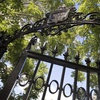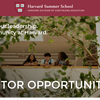{shortcode-242245c636ac223ef09f24bda4f0e3c6655f69ef}
The planning body for a University-wide faculty senate is considering whether faculty should push for representation on the Harvard Corporation, the University’s highest governing body, according to its first progress report released Saturday.
The planning body — which is interviewing members of faculty senates at other universities to develop designs for Harvard’s own senate — is also considering the size of the senate and possible voting procedures. The group plans to draft proposed senate bylaws by mid-June and share them for discussion in the fall 2025 semester.
University Professor Danielle S. Allen, who has led the effort to form a faculty senate, said in an interview that the planning body’s current goal was to gather information from other schools to determine which attributes for a senate would best suit Harvard.
“What we’re really trying to do is find the combination of mechanisms that are the right fit for Harvard,” Allen said. “You’ve got to think about your underlying institutional structure, and you’re trying to find the right pieces and parts to fit your context.”
The body, whose work launched in December, is meeting over Zoom every 10 days and has established five subcommittees. Each subcommittee is tasked with a different area of inquiry, including the senate’s eligibility guidelines, procedures such as the threshold for consensus, the structure of offices and subcommittees, communication with University administrators, and alternative modes of faculty governance — including the possibility of adding a faculty representative to the Corporation.
Since the effort to form a faculty senate launched last spring, eight of Harvard’s nine faculties have voted to send delegates to the body, leaving Harvard Business School as the only faculty yet to join. Allen said she couldn’t speak to why HBS had not signed onto the effort.
The body has already met with faculty senate members at Duke University, University of Chicago, Northwestern University, and Stanford University. During these conversations, members of other faculty senates have “expressed surprise” at the absence of such a group at Harvard, the report read.
The group has also had conversations with faculty at peer schools about alternative forms of governance — such as a citizens assembly, an appointed advisory board, and faculty representation on governing boards — that could supplement or replace a faculty senate.
“There have been some senates where a senate officer actually sits on the Corporation,” Allen said, adding that some universities have a “routine expectation” that a committee from their faculty senate attends at least one governing board meeting.
Harvard Graduate School of Education and Kennedy School lecturer Timothy P. McCarthy ’93, who takes turns with Allen chairing meetings of the planning body, said the group was taking the question of faculty representation on the Corporation and other alternative governance systems “seriously.”
But it’s not clear whether the governing boards will be amenable to adding faculty representatives to their ranks — or whether efforts to expand faculty authority will gain support from Harvard’s central administration, which has so far shown skepticism toward the proposed senate.
In February, University President Alan M. Garber ’76 appointed 16 faculty to Harvard’s inaugural faculty advisory council to “regularly” provide him with guidance. The council was convened months after faculty launched their push for a faculty senate.
The planning body is also considering whether the senate should serve an advisory role, meaning it would communicate concerns to the University’s administration, or a legislative role that would allow it to have a direct hand in governance.
Allen said the framework set up last spring was “oriented towards the advisory picture,” but that faculty senates with advisory roles still have significant sway at other universities.
“That’s true of a lot of senates where that advisory role is really quite impactful,” Allen said. “So to say advisory is not to say unimpactful.”
The planning body’s progress comes as calls from Harvard’s faculty for more say in the University’s governance have only grown louder amid attacks on higher education from President Donald Trump’s administration. Last week, the Faculty of Arts and Sciences elected six new members to its Faculty Council — several of whom said they joined the body to play a bigger role in Harvard’s decision making.
When asked whether Trump’s pressure campaign on universities and the growing demands for faculty governance had injected more urgency into the planning body’s work, Allen said the group was already working as quickly as possible.
“I don’t know if it’s possible to have extra urgency,” she said. “Everything we’ve described sounds really slow, but we’re literally working as fast as we can.”
The progress report said the body would produce several deliverables, including an overview of the group’s findings, bylaws for the senate, a set of “exemplary cases” that the senate could address, and descriptions of the additional forms of governance that the body might recommend.
Several members, including Computer Science professor Boaz Barak, are on leave for the semester, but Allen and McCarthy said that they have remained involved in the group’s work. Members of the planning body are required to attend two-thirds of the meetings.
McCarthy said that he was proud that the planning body had facilitated engaged collaboration between its members and across Harvard’s various schools.
“The huge opportunity of this is that folks are talking to each other across schools and departments and disciplines in ways that I certainly haven’t seen in my 25 years here,” McCarthy said. “We’re a large organism, and that kind of communication across the tubs is really vital.”
—Staff writer William C. Mao can be reached at william.mao@thecrimson.com. Follow him on X @williamcmao.
—Staff writer Veronica H. Paulus can be reached at veronica.paulus@thecrimson.com. Follow her on X @VeronicaHPaulus.
Read more in University News
Pritzker Says Harvard Is ‘All Over’ Supporting Students Whose Visas Were Revoked












